New England Patriots
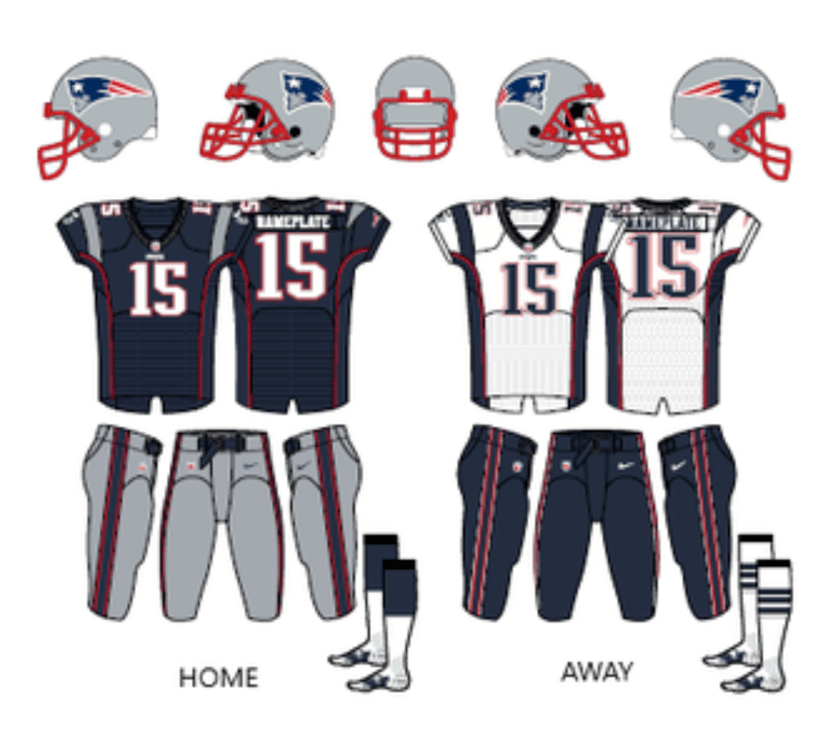
New England Patriots

| New England Patriots | |||||
|---|---|---|---|---|---|
| **Established November 16, 1959 (November 16, 1959)[1]** First season: 1960 Play in and headquartered in Gillette Stadium Foxborough, Massachusetts | |||||
| |||||
| League/conference affiliations | |||||
American Football League (1960–1969)
| |||||
Current uniform | |||||
| Team colors | Nautical blue, red, New Century silver, white[2][3][4] | ||||
| Mascot | Pat Patriot | ||||
| Personnel | |||||
| Owner(s) | Robert Kraft | ||||
| Chairman | Robert Kraft | ||||
| CEO | Robert Kraft | ||||
| President | Jonathan Kraft | ||||
| General manager | Bill Belichick (de facto) | ||||
| Head coach | Bill Belichick | ||||
| Team history | |||||
| Team nicknames | |||||
| |||||
| Championships | |||||
League championships (6)
| |||||
Conference championships (11)
| |||||
Division championships (20)
| |||||
| Playoff appearances (26) | |||||
| Home fields | |||||
| |||||
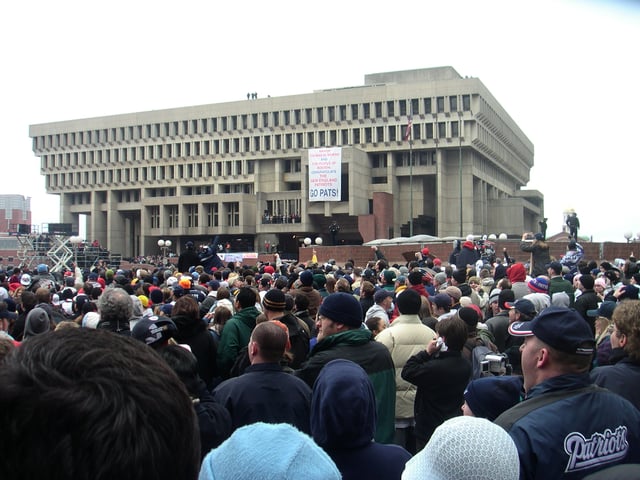
Patriot fans rally in front of Boston City Hall following the Super Bowl XXXVIII championship
The New England Patriots are a professional American football team based in the Greater Boston area. The Patriots compete in the National Football League (NFL) as a member club of the league's American Football Conference (AFC) East division. The team plays its home games at Gillette Stadium in the town of Foxborough, Massachusetts, which is located 21 miles (34 km) southwest of downtown Boston, Massachusetts, and 20 miles (32 km) northeast of downtown Providence, Rhode Island. The Patriots are also headquartered at Gillette Stadium.
Founded in 1959 as the Boston Patriots, an original member of the American Football League (AFL), the team joined the NFL in the leagues' 1970 merger, then changed its name when it moved to Foxborough in 1971. The New England Patriots played their home games at Foxboro Stadium through 2001, then moved to Gillette Stadium at the start of the 2002 season. The Patriots' rivalry with the New York Jets is considered one of the most bitter rivalries in the NFL.
Since the arrival of head coach Bill Belichick and quarterback Tom Brady in 2000, the Patriots have become one of the most successful teams in NFL history, claiming 16 AFC East titles as part of 18 consecutive winning seasons since 2001. The franchise has since set numerous notable records, including most wins in a ten-year period (126, in 2003–2012), an undefeated 16-game regular season in 2007, the longest winning streak consisting of regular season and playoff games in NFL history (a 21-game streak from October 2003 to October 2004), and the most consecutive division titles won by a team in NFL history (ten straight division titles from 2009 to 2018). The team owns the record for most Super Bowl appearances (nine) and wins (six) by a head coach–quarterback tandem, most conference championships overall (eleven), most Super Bowl appearances overall (eleven), tied with the Pittsburgh Steelers for the most Super Bowl wins (six), and tied with the Denver Broncos for the most Super Bowl losses (five).
| New England Patriots | |||||
|---|---|---|---|---|---|
| **Established November 16, 1959 (November 16, 1959)[1]** First season: 1960 Play in and headquartered in Gillette Stadium Foxborough, Massachusetts | |||||
| |||||
| League/conference affiliations | |||||
American Football League (1960–1969)
| |||||
Current uniform | |||||
| Team colors | Nautical blue, red, New Century silver, white[2][3][4] | ||||
| Mascot | Pat Patriot | ||||
| Personnel | |||||
| Owner(s) | Robert Kraft | ||||
| Chairman | Robert Kraft | ||||
| CEO | Robert Kraft | ||||
| President | Jonathan Kraft | ||||
| General manager | Bill Belichick (de facto) | ||||
| Head coach | Bill Belichick | ||||
| Team history | |||||
| Team nicknames | |||||
| |||||
| Championships | |||||
League championships (6)
| |||||
Conference championships (11)
| |||||
Division championships (20)
| |||||
| Playoff appearances (26) | |||||
| Home fields | |||||
| |||||
Franchise history

"Pat Patriot" logo, used through 1992
On November 16, 1959, Boston business executive Billy Sullivan was awarded the eighth and final franchise of the developing American Football League (AFL). The following winter, locals were allowed to submit ideas for the Boston football team's official name. The most popular choice – and the one that Sullivan selected – was the "Boston Patriots," with "Patriots" referring to those colonists of the Thirteen Colonies who rebelled against British control during the American Revolution and in July 1776 declared the United States of America an independent nation. Immediately thereafter, artist Phil Bissell of The Boston Globe developed the "Pat Patriot" logo.[7]
The Patriots struggled for most of their years in the AFL, and they never had a regular home stadium. Nickerson Field, Harvard Stadium, Fenway Park, and Alumni Stadium all served as home fields during their time in the American Football League. They played in only one AFL championship game, following the 1963 season, in which they lost to the San Diego Chargers 51–10. They did not appear again in an AFL or NFL post-season game for another 13 years.[7]
When the NFL and AFL merged in 1970, the Patriots were placed in the American Football Conference (AFC) East division, where they still play today.[7] The following year, the Patriots moved to a new stadium in Foxborough, Massachusetts, which would serve as their home for the next 30 years. As a result of the move, they announced they would change their name from the Boston Patriots to the Bay State Patriots, after the state of Massachusetts.[6] The name was rejected by the NFL and on March 22, 1971, the team officially announced they would change its geographic name to New England.[7]
During the 1970s, the Patriots had some success, earning a berth to the playoffs in 1976—as a wild card team—and in 1978—as AFC East champions. They lost in the first round both times. In 1985, they returned to the playoffs, and made it all the way to Super Bowl XX, which they lost to the Chicago Bears 46–10. Following their Super Bowl loss, they returned to the playoffs in 1986, but lost in the first round. The team would not make the playoffs again for eight more years. During the 1990 season, the Patriots went 1–15. They changed ownership three times in the ensuing 14 years, being purchased from the Sullivan family first by Victor Kiam in 1988, who sold the team to James Orthwein in 1992. Though Orthwein's period as owner was short and controversial, he did oversee major changes to the team, first with the hiring of former New York Giants coach Bill Parcells in 1993. Orthwein and his marketing team also commissioned the NFL to develop a new visual identity and logo, and changed their primary colors from the traditional red, white and blue to blue and silver for the team uniforms.[8] Orthwein intended to move the team to his native St. Louis, Missouri (where it would have been renamed as the St. Louis Stallions), but instead sold the team in 1994 for $175 million to Robert Kraft.[7]
Since then, the Patriots have sold out every home game in both Foxboro Stadium and Gillette Stadium.[7] By 2009, the value of the franchise had increased by over $1 billion, to a Forbes magazine estimated value of $1.361 billion, third highest in the NFL only behind the Dallas Cowboys and Washington Redskins.[9][10][11] As of July 2018, the Patriots are the sixth most valuable sports franchise in the world according to Forbes magazine with a value of $3.7 billion.[12]
Continuing on as head coach under Kraft's ownership, Parcells would bring the Patriots to two playoff appearances, including Super Bowl XXXI, which they lost to the Green Bay Packers by a score of 35–21. Pete Carroll, Parcells's successor, would also take the team to the playoffs twice in 1997 and 1998 before being dismissed as head coach after the 1999 season.[7]
The Patriots hired head coach Bill Belichick, who had served as defensive coordinator under Parcells including during Super Bowl XXXI, in 2000. Their new home field, Gillette Stadium, opened in 2002 to replace the aging Foxboro Stadium. Under Belichick, the team won three Super Bowls in four years (2001, 2003, and 2004), over the St. Louis Rams, Carolina Panthers, and Philadelphia Eagles, respectively. The Patriots finished the 2007 regular season with a perfect 16–0 record, becoming only the fourth team in league history to go undefeated in the regular season, and the only one since the league expanded its regular season schedule to 16 games.[7] After advancing to Super Bowl XLII, the team's fourth Super Bowl in seven years, the Patriots were defeated by the Giants to end their bid for a 19–0 season. With the loss, the Patriots ended the year at 18–1, becoming only one of three teams to go 18–1 along with the 1984 San Francisco 49ers and the 1985 Chicago Bears.[13]
The Patriots' returned to the Super Bowl in 2012 but lost again to the Giants, 21–17.[14] In 2015, the Patriots reached a record-tying eighth Super Bowl, where they defeated the defending champions Seattle Seahawks by a score of 28–24 to win Super Bowl XLIX for their fourth league title.[15] The Patriots became the first team to reach nine Super Bowls in the 2016–17 playoffs and faced the Atlanta Falcons in Super Bowl LI,[16] which ended up paving the way for their fifth Super Bowl victory,[17] tying them with the Dallas Cowboys and the San Francisco 49ers for the second-most in NFL history, 1 behind the Pittsburgh Steelers with 6; the game was also the first Super Bowl to go into overtime.[18] The Patriots extended their record to ten Super Bowl appearances in the 2017–18 playoffs but lost to the Philadelphia Eagles in Super Bowl LII, on February 4, 2018, at U.S. Bank Stadium.[19] The Patriots extended their record to eleven Super Bowls reached with Super Bowl LIII, following their victory of the Kansas City Chiefs in the 2019 AFC Championship game. They defeated the Los Angeles Rams 13-3 to win their sixth Super Bowl, tying them with the Pittsburgh Steelers for most Super Bowl victories in NFL history.[20][21]
Logos and uniforms
Logos

Current New England Patriots wordmark logo, first unveiled on July 3, 2013[22]
The Patriots original helmet logo was a simple tricorne hat, used only for the 1960 season. From 1961 to 1992, the Patriots used a logo of a Revolutionary War minuteman hiking a football. The Patriots script logo during this time consisted of a western-style font. The minuteman logo became known as the "Pat Patriot" logo, which later became the name of the team's mascot.[23]
In 1979, the Patriots worked with NFL Properties to design a new, streamlined logo, to replace the complex Pat Patriot logo. The new logo featured the blue and white profile of a minuteman in a tricorne hat set against a flag showing three red stripes separated by two white stripes. Team owner Billy Sullivan decided to put the new logo up to a vote against Pat Patriot with the fans at the September 23 home game against the San Diego Chargers, using a sound level meter to judge the crowd's reaction. The new logo was decidedly rejected by the crowd in favor of Pat, and the concept was shelved.[24]
In 1993, a new logo was unveiled involving the gray face of a minuteman wearing a red, white and blue hat that begins as a tricorne and transitions into a flowing banner-like design. The logo bears some superficial resemblance to the aborted 1979 logo. It became popularly known as the "Flying Elvis" due to many observing its resemblance to the profile of a young Elvis Presley.[23] In 2000, the blue color was darkened.[23]
On July 3, 2013, the Patriots unveiled a new logo, which replaced the script of their previous wordmark with block letters and modified the tricorne hat.[22]
Uniforms
1960–1992
The Patriots originally wore red jerseys with white block numbering at home, and white jerseys with red block numbering on the road. Both uniforms used white pants and white helmets, first with the hat logo over the player's number, then with the "Pat Patriot" logo starting in 1961.[25] A blue stripe was added to the two red helmet stripes in 1964.[25] The numbers on both the home and away jerseys gained a blue outline in 1973.[25] In 1979, the Patriots began the first of many sporadic runs of wearing red pants with the white jerseys.[25] The red pants were dropped in 1981, but returned in 1984. After being dropped again in 1988, they were used again from 1990 to 1992.[25]
1993–present
The Patriots underwent a complete identity overhaul before the 1993 season, starting with the introduction of the aforementioned "Flying Elvis" logo. The new uniforms consisted of a royal blue home jersey and a white away jersey.[23] The helmet was silver with the Flying Elvis logo and no additional striping.[23] Both uniforms used silver pants, originally with stripes designed to look like those flowing from the Flying Elvis, but these were changed to simple red and blue stripes after one season. When they debuted, both the home and away jerseys used red block numbers with a blue and white outline, but after one season the home uniforms switched to the now-familiar white with a red outline.[26]
However, in 2000, the Patriots also became one of the only teams to drop the rounded numbers and switched back to block numbers.[26] Also that year, the shade of blue was darkened from royal to nautical blue.[26] The Patriots, unsatisfied with the white-on-silver road look, also took the opportunity to introduce blue pants to be worn with the white jersey, offering a better contrast. To better match the blue pants, the number on the white jersey was switched from red to blue.[26]
Alternate uniforms
In 1994, the Patriots wore the "Pat Patriot" helmets and plain white striped pants from two seasons prior as alternates as part of the NFL's 75th anniversary celebration. In 2002, NFL teams were allowed to add a permanent third jersey to be worn in a maximum of two games. The Patriots reintroduced a red jersey as their alternate, complimented with the old-style "Pat Patriot" helmet.[23] In 2003, the Patriots changed their alternate to a silver jersey with blue pants. For this uniform, the "Flying Elvis" helmet was used.[23] The uniform was identical to the white jersey with any areas of white replaced by silver. These uniforms were dropped after 2007. No alternate uniform was used in 2008. In 2009, the red alternate was reintroduced, again accompanied by the "Pat Patriot" helmet. An alternate white road jersey was also worn with the older helmet for one game, using red numbers, in tribute to the 50th anniversary of the AFL. The red alternate gained a blue outline around the numbers in 2010 and this was worn through 2012. The Patriots retired their alternate red uniforms in 2013, thanks to a new NFL rule outlawing throwback alternate helmets.[27]
In 2016, the Patriots took part in the NFL Color Rush program, wearing monochrome navy uniforms on September 22 against the Houston Texans.[28] They have worn them a total of four times since 2016. In 2017, an all-white Color Rush uniform was introduced and used for the Patriots' Thursday night road game against the Tampa Bay Buccaneers.
Rivalries
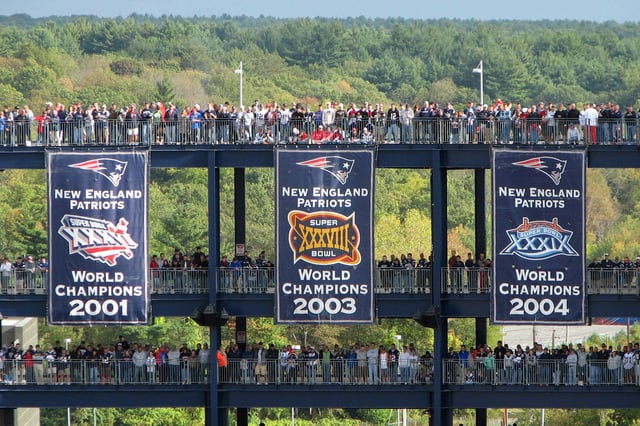
Super Bowl banners at Gillette Stadium prior to the Patriots winning Super Bowls XLIX, LI, and LIII
In terms of number of games played, the Patriots have competed most against other teams teams in the AFC East division: the Buffalo Bills, Miami Dolphins, and New York Jets, who were all a part of the AFC East division since the AFL-NFL Merger, as well as the former AFL Eastern division. The Patriots also share rivalries with several teams outside of their division, including the Indianapolis Colts, who were members of the AFC East from 1970-2001, the Baltimore Ravens and the Pittsburgh Steelers.
New York Jets
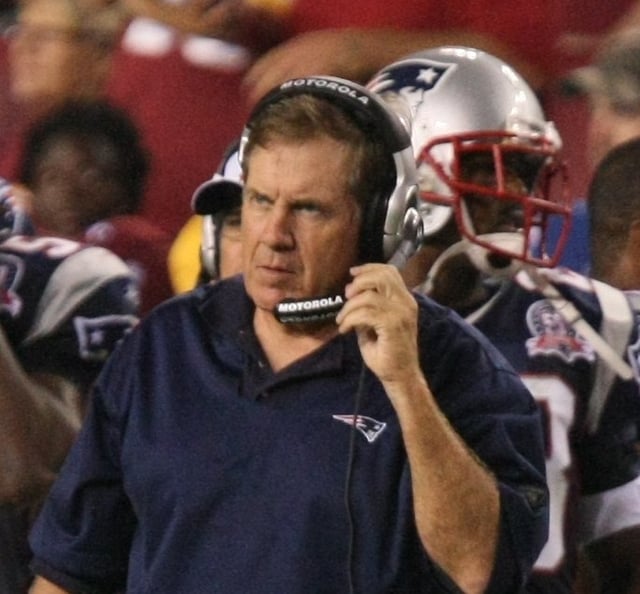
Patriots' head coach Bill Belichick was "traded" from the Jets to the Patriots in 2000.[29]
The closest geographically has been the rivalry with the New York Jets.[30] The Patriots and Jets have been in the same division (what is now the AFC East) since both teams' foundings in 1960, and have played each other at least twice a year since then.[31] The rivalry between the Jets and Patriots has escalated since 1996, when Patriots head coach Bill Parcells left the Patriots under controversy to become the head coach of the Jets; he was replaced by former Jets coach Pete Carroll.[31] Four years later Carroll was fired, and Parcells's assistant, Bill Belichick, resigned the day he was named the Jets' head coach to become the head coach of the Patriots.[32] Six years after that, Eric Mangini, an assistant under Belichick, became the head coach of the Jets.[33]
Bill Belichick achieved his 200th career head coaching win (regular season and playoffs) on November 22, 2012, defeating the Jets 49–19; it was his 163rd such win as Patriots coach.[34] The Patriots defeated the Jets in Week seven of the 2015 season by a score of 30–23, to give them a 6–0 record to date. [35]
Baltimore/Indianapolis Colts
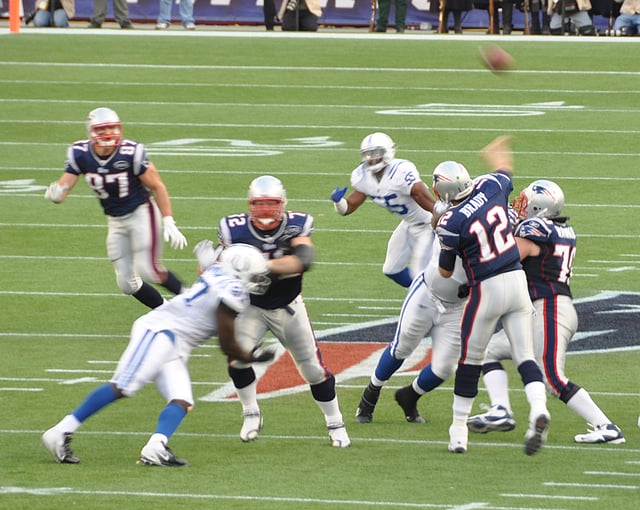
The Pats facing the Colts in 2011
The Patriots rivalry with the Baltimore/Indianapolis Colts ran through the two clubs' tenure together in the AFC East (1970–2001). The two clubs clashed in several close games, such as on December 19, 1971, as a late Patriots touchdown decided a 21–17 New England win; on September 18, 1978, the Colts rallied to defeat the Patriots 34–27 on Monday Night Football on a virtual one-man scoring rampage by running back Joe Washington; on September 4, 1983, the Colts defeated the Patriots in overtime 29–23 in their final season in Baltimore.[36] The Patriots defeated the Colts in back-to-back overtime games, 23–17 on December 8, 1991, and 37–34 on November 15, 1992.[36]
Even though the two clubs were placed in separate divisions in the NFL's 2002 divisional realignment, their rivalry did not diminish. At that time, both teams were among the best in the AFC, and both were led by likely Hall of Fame quarterbacks, Peyton Manning (for the Colts) and Tom Brady (for the Patriots) The teams met three times in four years (2003, 2004, 2006) in the playoffs, with the winner going on to win that season's Super Bowl each time. The Manning portion of the rivalry began in Manning's rookie season, 1998; in 1999 Manning suffered a bitter 31–28 loss in September as the Patriots behind Drew Bledsoe erased a 28–7 Colts lead, then defeated the Patriots 20–15 in Indianapolis on December 12. The Brady–Manning portion of the rivalry began on September 30, 2001, as Brady made his first NFL start in a 44–13 Patriots win at Foxboro; on October 21 the Patriots defeated the Colts at the RCA Dome 38–17.[36]
After the Colts left the AFC East in 2002, they first met on November 30, 2003, in a 38–34 Patriots win decided on a last-second goal line stand by the Patriots.[36] The Colts broke a six-game Patriot winning streak in the rivalry in November 2005,[36] then won twice in 2006;[36] in the AFC Championship Game the Colts erased a 21–6 halftime lead; the game lead tied or changed seven times in the second half before a late touchdown led to a 38–34 Colts win. The November 4, 2007, meeting involved both teams being unbeaten to that point; the 8–0 Patriots and the 7–0 Colts. The Patriots rallied to win 24–20.[37] The Colts won again in 2008 and then erased a large Patriots lead in 2009's 4th and 2 game. Manning's final meeting with the Patriots as a Colt came in November 2010; a late interception sealed a 31–28 Patriots win.[38] In 2012, the Patriots faced the Colts, quarterbacked now by Andrew Luck, on November 18; the Patriots defeated the Colts 59–24.[39] The Patriots also beat the Colts on January 12, 2014, 43–22.[40] The Patriots played the Colts in the playoffs again on January 18, 2015, in the AFC title game, winning 45–7.[41]
Buffalo Bills
The Patriots and the Bills were both charter members of the AFL, and even competed with each other in an AFL playoff game. They have remained divisional rivals since the NFL-AFL merger. Prior to the rise of Tom Brady, the two teams shared a mellow, yet occasionally competitive rivalry, featuring highlights from players such as O.J. Simpson, Steve Grogan, Joe Ferguson, Jim Kelly, and Drew Bledsoe. However, Brady has dominated the Bills ever since taking over as the Patriots' franchise quarterback, holding a 29-3 regular season record over them.[42] Though Patriots fans usually feel apathetic towards the Bills, Bills fans have come to despise the Patriots more than any other rival.[43] The rivalry has remained somewhat intense in recent years with multiple players having played for both teams, the Bills usually giving their all when playing the Patriots, and the presence of Rex Ryan, who coached both the Bills and Jets and was known for his trash-talk.[44]
As of 2018, Brady is the winningest quarterback in the Buffalo Bills' New Era Field since 2001, amassing 15 wins and beating out 18 Bills quarterbacks that have started for the Bills in that timespan. Brady edges out Tyrod Taylor and Bledsoe (who played for the Bills from 2002 to 2004), who have 14 wins apiece in New Era Field.[45]
Miami Dolphins
The Patriots first played the Miami Dolphins in 1966 in the AFL, when Miami was one of two expansion teams to debut that year in that league. The Dolphins dominated the Patriots in the 1970s and 1990s, but the two teams remained competitive with each other for years before the rise of Tom Brady. Brady, however, struggled occasionally against the Dolphins in the 2000s before reasserting dominance in the 2010s. The Patriots and Dolphins are the only two teams in the Super Bowl era to post undefeated regular season records, with Miami going 14-0 in 1972 and the Patriots going 16-0 in 2007.[46] Notable moments between the clubs include the Snowplow Game, three playoff matchups, the Dolphins revealing their Wildcat offense against the Patriots,[47] and the Miracle in Miami.[48]
Baltimore Ravens
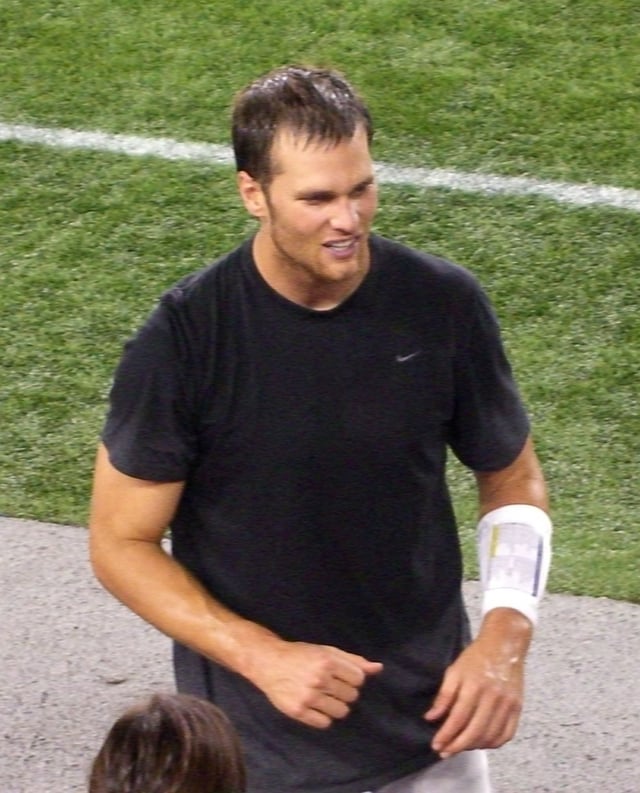
Tom Brady has a career record of 8–3 against the Ravens.
The Ravens first met the New England Patriots in 1996,[49] but the rivalry truly started in 2007 when the Ravens suffered a bitter 27–24 loss in the Patriots' quest for perfection.[50] The rivalry began to escalate in 2009 when the Ravens lost to the Patriots 27–21 in a game that involved a confrontation between Patriots quarterback Tom Brady and Ravens linebacker Terrell Suggs.[51] Both players would go on to take verbal shots at each other through the media after the game. The Ravens defeated the Patriots in the 2009 AFC Wild Card playoff game, 33–14.[52] This was the first time the Ravens had ever defeated the Patriots. The Ravens faced the Patriots in week six of the 2010 season. The Patriots ended up winning 23–20 in overtime; the game caused controversy from a hit to the helmet of tight end Todd Heap by Patriots safety Brandon Meriweather.[53]
The Ravens played the Patriots for the third consecutive season in the 2012 AFC championship game, which the Ravens lost 23–20.[54] The rivalry reached a new level of friction with this, the second career playoff game between the two clubs. The Ravens clawed to a 20–16 lead in the fourth quarter, but Patriots quarterback Tom Brady dove into the end zone to make the score 23–20 with around 11 minutes remaining; this proved to be the winning touchdown.[54] On the Ravens' last possession of the game, quarterback Joe Flacco threw a pass to wide receiver Lee Evans in the corner of the end zone which looked to be the game-winning touchdown, before a last-second strip by Sterling Moore forced the ball from the hands of Evans, forcing the game to be decided on a last-minute field goal by Ravens placekicker Billy Cundiff.[54] With 11 seconds remaining on the clock, the kicker missed the 32-yard field goal attempt, allowing the Patriots to kill the clock on their way to Super Bowl XLVI for a rematch with the New York Giants.[54]
The Ravens' first regular-season win over the Patriots came on September 23, 2012. The game was emotional as receiver Torrey Smith was competing following the death of his brother in a motorcycle accident just the night before.[55] Smith caught two touchdowns in a back and forth game; the Ravens erased a 13–0 lead in the first half and led 14–13, but the Patriots scored at the end of the second quarter for a 20–14 lead. The lead changed twice in the third quarter and the Patriots led 30–21 in the fourth, but the Ravens scored on Smith's second touchdown catch. The Ravens were stopped on fourth down but the Patriots had to punt; in the final two minutes a pass interference penalty on Devin McCourty put the ball at the Patriots 7-yard line; new Ravens kicker Justin Tucker booted a 27-yard field goal on the final play; the ball sailed directly over the upright and was ruled good; the quality of officiating by replacement referees caused controversy as Bill Belichick angrily reached for one of the referees as they were leaving the field, leading to a $50,000 fine later that week.[56][57]
The two teams met again on January 20, 2013, in the AFC Championship, where the Ravens won 28–13.[58] The Patriots led at halftime, 13–7, but the Ravens defense gave up no points in the 2nd half.[58] It was the first time ever that Tom Brady lost a game at home after leading at halftime, and the first time a road team beat the Patriots in the AFC Championship.[58]
The two teams met once again at Gillette Stadium in the playoffs on January 10, 2015. The Patriots trailed by as much as 14 twice, before beating the Ravens 35–31 to advance to the AFC Championship.[59]
Culture
Cheerleaders and mascot
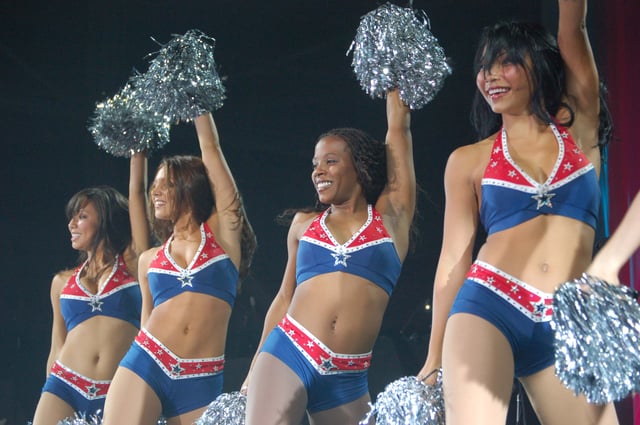
The team's cheerleading squad performing a routine in 2007
The Patriots' mascot is Pat Patriot, a revolutionary minuteman wearing a Patriots home jersey.[63]
The Patriots also employ a corps known as the End Zone Militia. During each game, about ten men dressed as minutemen line the back of each end zone. When the Patriots score a touchdown, field goal, point-after-touchdown or safety, the militia behind the opposite end zone fire a volley of blanks from flintlock muskets. Per an interview with the Loren & Wally Show on WROR 105.7 FM in and around the time of Super Bowl XLIX, said shots use double the load of black powder than a regular historical reenactor does, specifically 200 grains, in order to be heard throughout the stadium. ESPN writer Josh Pahigian named this one of the top ten celebrations in the league in 2007.[64]
Ozzy Osbourne's "Crazy Train" has become an unofficial theme song and entrance anthem for the Patriots at their home games and Super Bowls, starting when they hosted the NFL Kickoff at Gillette Stadium on September 8, 2005.[65][66]
Facilities
Stadium
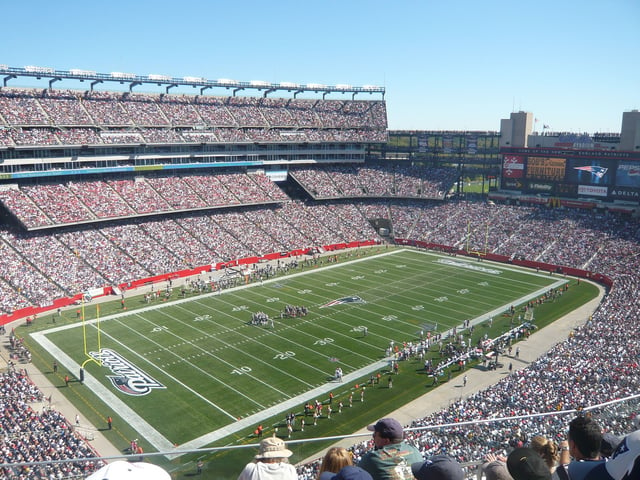
Gillette Stadium, home of the Patriots
Since 2002, the Patriots' home stadium has been Gillette Stadium, a $350 million facility privately financed by Kraft. It houses all administrative offices for the team and its owning entity, The Kraft Group, as well as the Kraft-owned Major League Soccer team, the New England Revolution.[67] The field, which was originally natural grass, was replaced with a FieldTurf surface during the 2006 season.[68] The Patriots have a 20-3 playoff record in this stadium as of the conclusion of the 2018 NFL season.[69][70] The area around the stadium was developed, beginning in 2007, into a $375 million "lifestyle and entertainment center" called Patriot Place; among its largest structures is a multi-floor restaurant and bar called CBS Scene.[71]
Prior to 2002, the Patriots played in Foxboro Stadium dating back to 1971, the team's second year in the NFL after the AFL–NFL merger, and this venue was also privately funded. The final game in this stadium was the 2001 AFC Divisional Playoff game which was a 16-13 overtime win over the visiting Oakland Raiders, known for the raging snowstorm and the "tuck rule" call.[67]
During the team's days in the American Football League and its first year in the NFL, the Boston Patriots were hosted by a number of fields in or around Boston—they played at Nickerson Field (1960–62), Fenway Park (1963–68), Alumni Stadium (1969), and Harvard Stadium (1970).[67]
Aircraft
In 2017 the Patriots purchased two Boeing 767-300ERs for use as team planes, with one serving as the backup, which were ready in time for the 2017 NFL season. This made them the first team in league history to own their own planes.[72] At the time it was getting more difficult for professional sports teams to book private charter flights, with eight teams being dropped that season, as major commercial airlines were instead focusing on more profitable scheduled flights.[73] The two jet airliners, N366AA and N39367, were previously operated by American Airlines from 1991 to 2016. The planes are known affectionately as "AirKrafts" after team owner Robert Kraft.[74] Kraft has lent one of the planes to transport students to the March for Our Lives demonstration in Washington D.C.[75]
Season-by-season records
Records
| All-time Patriots leaders | |||
|---|---|---|---|
| Leader | Player | Record number | Years played for Patriots |
| Passing[76] | Tom Brady | 70,855 passing yards | 2000–present |
| Rushing[77] | Sam Cunningham | 5,453 rushing yards | 1973–1982 |
| Receiving[78] | Stanley Morgan | 10,352 receiving yards | 1977–1989 |
| Scoring[79] | Stephen Gostkowski | 1,755 points | 2006–present |
| Coaching wins[80] | Bill Belichick | 256 wins | 2000–present |
Strategy
Under head coach Bill Belichick, the Patriots have employed specific on-field and off-field strategies. On the field, the Patriots have typically used an "Erhardt–Perkins" offense and a "Fairbanks–Bullough" 3–4 defense, referred to commonly as a two-gap 3–4 defensive system.[81] Their philosophy in making personnel decisions and in game planning has focused on the "team" concept,[82] stressing preparation, strong work ethic, versatility,[83] and lack of individual ego.[84] This approach, which has led to six Super Bowl victories under Belichick, was analyzed in the 2004 book Patriot Reign.
Players of note
Roster
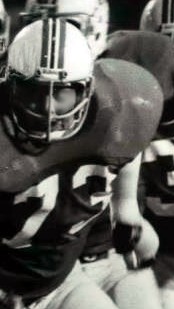
John Hannah played on the Pats' offensive line from 1973 to 1985.
New England Patriots roster | |||||||||
|---|---|---|---|---|---|---|---|---|---|
Quarterbacks
| Offensive linemen
| Linebackers
| Reserve lists
| ||||||
| |||||||||
Retired numbers
| New England Patriots retired numbers | ||||
| No. | Player | Position | Tenure | Retired |
|---|---|---|---|---|
| 20 | Gino Cappelletti | WR, K | 1960–1970 | |
| 40 | Mike Haynes | CB | 1976–1982 | |
| 57 | Steve Nelson | LB | 1974–1987 | July 11, 1988 |
| 73 | John Hannah | G | 1973–1985 | |
| 78 | Bruce Armstrong | T | 1987–2000 | 2000 |
| 79 | Jim Lee Hunt | DL | 1960–1971 | |
| 89 | Bob Dee | DL | 1960–1967 | |
New England Patriots Hall of Fame members
The New England Patriots feature 27 former players and two contributors in their team hall of fame, established in 1991. A committee of media and staff selected 11 players for enshrinement between 1991 and 2001, before a six-year span of no selections. In 2007, in advance of the 2008 opening of The Hall at Patriot Place, the Patriots introduced a new nomination committee to select three candidates, with the winner of an Internet fan vote being enshrined in the hall of fame.[85] In order to be eligible, players and coaches must be retired for at least four years. Beginning in 2011, and meeting every five years, a senior selection committee has the option of voting a player who has been retired for at least 25 seasons into the hall of fame.[86]
Former owner Billy Sullivan was inducted by owner Robert Kraft in March 2009, the Patriots' 50th season, as a contributor.[87]
Additionally, five of these Patriots players have also been enshrined in the Pro Football Hall of Fame. The Patriots have officially retired seven uniform numbers.[88]
| New England Patriots Hall of Fame | |||||||||
|---|---|---|---|---|---|---|---|---|---|
| Players | |||||||||
| No. | Name | Positions | Seasons | Inducted | No. | Name | Positions | Seasons | Inducted |
| 73 | John Hannah | G | 1973–1985 | 1991 (Pro: 1991) | 39 | Sam Cunningham | RB | 1973–1982 | 2010 |
| 85 | Nick Buoniconti | LB | 1962–1968 | 1992 (Pro: 2001) | 11 | Drew Bledsoe | QB | 1993–2001 | 2011 |
| 20 | Gino Cappelletti | WR/K | 1960–1970 | 1992 | 56 | Jon Morris | C | 1964–1974 | 2011 |
| 89 | Bob Dee | DL | 1960–1967 | 1993 | 80 | Troy Brown | WR/PR/CB | 1993–2007 | 2012 |
| 79 | Jim Lee Hunt | DT | 1960–1971 | 1993 | 54 | Tedy Bruschi | LB | 1996–2008 | 2013 |
| 57 | Steve Nelson | LB | 1974–1987 | 1993 | 24 | Ty Law | CB | 1995–2004 | 2014 (Pro: 2019) |
| 15 | Vito "Babe" Parilli | QB | 1961–1967 | 1993 | 55 | Willie McGinest | LB/DE | 1994–2005 | 2015 |
| 40 | Mike Haynes | CB | 1976–1982 | 1994 (Pro: 1997) | 65 | Houston Antwine | DL | 1961–1971 | 2015 |
| 14 | Steve Grogan | QB | 1975–1990 | 1995 | 33 | Kevin Faulk | RB | 1999–2011 | 2016 |
| 56 | Andre Tippett | LB | 1982–1993 | 1999 (Pro: 2008) | 26 | Raymond Clayborn | CB | 1977–1989 | 2017 |
| 78 | Bruce Armstrong | T | 1987–2000 | 2001 | 72 | Matt Light | T | 2001–2011 | 2018 |
| 86 | Stanley Morgan | WR | 1977–1989 | 2007 | 37 | Rodney Harrison | S | 2003–2008 | 2019 |
| 87 | Ben Coates | TE | 1991–1999 | 2008 | 70 | Leon Gray | T | 1973–1978 | 2019 |
| 35 | Jim Nance | FB | 1965–1971 | 2009 | |||||
| Contributors | |||||||||
| Name | Positions | Seasons | Inducted | Name | Positions | Seasons | Inducted | ||
| Billy Sullivan | Owner & founder | 1960–1988 | 2009 | Gil Santos | Broadcaster | 1972–1979 1991–2012 | 2013 | ||
| New England Patriots Hall of Famers | ||||
|---|---|---|---|---|
| Players | ||||
| No. | Name | Position(s) | Season(s) | Inducted |
| 28 | Curtis Martin | RB | 1995–1997 | 2012 |
| 55 | Junior Seau | LB | 2006–2009 | 2015 |
| 81 | Randy Moss | WR | 2007–2010 | 2018 |
| Coaches and Executives | ||||
| Name | Position(s) | Season(s) | Inducted | |
| Bill Parcells | Head coach | 1993–1996 | 2013 | |
All-decade teams
1960s (AFL)
1970s, 1980s, 1990s
In March 2009, as part of the Patriots' 50th anniversary, a group of local media and other team figures selected all-decade teams for the 1970s, 1980s, and 1990s:[90]
2000s
Anniversary teams
35th anniversary (1994)
In 1994, a group of local media selected a 35th anniversary team:[89]
50th anniversary (2009)
In 2009, the Patriots Hall of Fame selection committee selected a 50th anniversary team:[89]
All-time first-round draft picks
Key
| ^ | Indicates the player was inducted into the Pro Football Hall of Fame. |
|---|---|
| * | Selected number one overall |
| † | Indicates the player was selected for the Pro Bowl at any time in their career. |
| — | The Patriots did not draft a player in the first round that year. |
| Year | Each year links to an article about that particular AFL, Common, or NFL Draft. |
| Pick | Indicates the number of the pick within the first round |
| Position | Indicates the position of the player in the NFL |
| College | The player's college football team |
| C | Center | CB | Cornerback | DB | Defensive back | DE | Defensive end | |||
| DL | Defensive lineman | DT | Defensive tackle | FB | Fullback | FS | Free safety | |||
| G | Guard | HB | Halfback | K | Placekicker | KR | Kick returner | |||
| LB | Linebacker | LS | Long snapper | OT | Offensive tackle | OL | Offensive lineman | |||
| NT | Nose tackle | P | Punter | PR | Punt returner | QB | Quarterback | |||
| RB | Running back | S | Safety | SS | Strong safety | TB | Tailback | |||
| TE | Tight end | WR | Wide receiver |
| Year | Pick | Player name | Position | College | Notes |
|---|---|---|---|---|---|
| Boston Patriots (1960–1970) | |||||
| 1960 | — | Gerhard Schwedes | RB | Syracuse | a |
| 1961 | 2 | Tommy Mason | RB | Tulane | b |
| 1962 | 6 | Gary Collins | WR | Maryland | c |
| 1963 | 7 | Art Graham | WR | Boston College | d |
| 1964 | 1 | Jack Concannon | QB | Boston College | e |
| 1965 | 7 | Jerry Rush | OT | Michigan State | f |
| 1966 | 3 | Karl Singer | OT | Purdue | d |
| 1967 | 21 | John Charles | CB | Purdue | |
| 1968 | 6 | Dennis Byrd | DE | NC State | |
| 1969 | 6 | Ron Sellers | WR | Florida State | |
| 1970 | 4 | Phil Olsen | DT | Utah State | |
| New England Patriots (1971–present) | |||||
| 1971 | 1 | Jim Plunkett | QB | Stanford | |
| 1972 | — | —No pick | — | — | g |
| 1973 | 4 | John Hannah^ | OG | Alabama | |
| 1973 | 11 | Sam Cunningham† | RB | USC | h |
| 1973 | 19 | Darryl Stingley | WR | Purdue | i |
| 1974 | — | —No pick | — | — | j |
| 1975 | 16 | Russ Francis† | TE | Oregon | |
| 1976 | 5 | Mike Haynes^ | CB | Arizona State | |
| 1976 | 12 | Pete Brock | C | Colorado | k |
| 1976 | 21 | Tim Fox† | S | Ohio State | l |
| 1977 | 16 | Raymond Clayborn† | CB | Texas | m |
| 1977 | 25 | Stanley Morgan† | WR | Tennessee | |
| 1978 | 18 | Bob Cryder | OG | Alabama | |
| 1979 | 25 | Rick Sanford | CB | South Carolina | |
| 1980 | 14 | Roland James | CB | Tennessee | |
| 25 | Vagas Ferguson | RB | Notre Dame | n | |
| 1981 | 19 | Brian Holloway† | OT | Stanford | |
| 1982 | 1 | Kenneth Sims | DE | Texas | |
| 27 | Lester Williams | DT | Miami (FL) | o | |
| 1983 | 15 | Tony Eason | QB | Illinois | |
| 1984 | 1 | Irving Fryar | WR | Nebraska | p |
| 1985 | 28 | Trevor Matich | C | BYU | q |
| 1986 | 26 | Reggie Dupard | RB | SMU | |
| 1987 | 23 | Bruce Armstrong† | OT | Louisville | |
| 1988 | 17 | John Stephens† | RB | Northwestern State | |
| 1989 | 16 | Hart Lee Dykes | WR | Oklahoma State | |
| 1990 | 8 | Chris Singleton | LB | Arizona | r |
| 10 | Ray Agnew | DE | NC State | s | |
| 1991 | 11 | Pat Harlow | OT | USC | t |
| 14 | Leonard Russell | RB | Arizona State | u | |
| 1992 | 13 | Eugene Chung | OT | Virginia Tech | v |
| 1993 | 1 | Drew Bledsoe | QB | Washington State | |
| 1994 | 4 | Willie McGinest† | DE | USC | |
| 1995 | 23 | Ty Law^ | CB | Michigan | |
| 1996 | 7 | Terry Glenn† | WR | Ohio State | |
| 1997 | 29 | Chris Canty | CB | Kansas State | |
| 1998 | 18 | Robert Edwards | RB | Georgia | w |
| 22 | Tebucky Jones | CB | Syracuse | ||
| 1999 | 17 | Damien Woody† | C | Boston College | x |
| 28 | Andy Katzenmoyer | LB | Ohio State | y | |
| 2000 | — | —No pick | — | — | z |
| 2001 | 6 | Richard Seymour† | DT | Georgia | |
| 2002 | 21 | Daniel Graham | TE | Colorado | aa |
| 2003 | 13 | Ty Warren | DT | Texas A&M | bb |
| 2004 | 21 | Vince Wilfork† | DT | Miami (FL) | cc |
| 32 | Benjamin Watson | TE | Georgia | ||
| 2005 | 32 | Logan Mankins† | OG | Fresno State | |
| 2006 | 21 | Laurence Maroney | RB | Minnesota | |
| 2007 | 24 | Brandon Meriweather† | S | Miami (FL) | dd |
| 2008 | 10 | Jerod Mayo† | LB | Tennessee | ee |
| 2009 | — | —No pick | — | — | ff |
| 2010 | 27 | Devin McCourty† | CB/S | Rutgers | gg |
| 2011 | 17 | Nate Solder | OT | Colorado | |
| 2012 | 21 | Chandler Jones† | DE | Syracuse | |
| 25 | Dont'a Hightower† | LB | Alabama | ||
| 2013 | — | —No pick | — | — | hh |
| 2014 | 29 | Dominique Easley | DT | Florida | |
| 2015 | 32 | Malcom Brown | DT | Texas | |
| 2016 | — | —No pick | — | — | ii |
| 2017 | jj | ||||
| 2018 | 23 | Isaiah Wynn | OT | Georgia | |
| 31 | Sony Michel | RB | Georgia | ||
| 2019 | 32 | N'Keal Harry | WR | Arizona State | |
Staff
The Patriots have had 14 coaches through their history. Their first coach was Lou Saban, who coached them to a 7–12–0 record in 1960/1961. Bill Belichick has the longest term as head coach with the Patriots.[92]
New England Patriots staff | ||||||
|---|---|---|---|---|---|---|
|
→Management [116] → More NFL staffs | |||||
| ||||||
Controversies
"Spygate"
During the 2007 season, the New England Patriots were disciplined by the league for videotaping New York Jets' defensive coaches' signals from an unauthorized location during a September 9, 2007 game.[93][94] Videotaping opposing coaches is not illegal in the NFL de jure, but there are designated areas allowed by the league to do such taping. After an investigation, the NFL fined Patriots head coach Bill Belichick $500,000 for his role in the incident, fined the Patriots $250,000, and docked the team their original first-round selection in the 2008 NFL Draft which would have been the 31st pick of the draft.[95]
"Deflategate"
During the 2015 AFC Championship Game against the Indianapolis Colts, allegations arose that the Patriots were using under-inflated footballs. It was even suggested that the Patriots' staff themselves deliberately deflated the footballs to give their team an unfair advantage during the playoffs.[96][97] A lengthy investigation and heated debate commenced shortly afterwards, with a full report being published in May 2015.[98][99] The Wells Report found that balls provided by the Patriots, who were the home team, indeed had less pressure on average than the balls provided by the Colts. Also notable was the findings of some suggestions of communication between Tom Brady and two Patriots locker room attendants, indicating Brady was likely "generally aware" of the situation and that the Patriots staff intentionally deflated the footballs.[99] A later study by the American Enterprise Institute called the evidence and methodology of the Wells report "deeply flawed" and "unreliable".[100]
In the aftermath of the incident, the NFL suspended Brady without pay for the first four games of the 2015 season, fined the Patriots $1 million, and forced them to forfeit their 2016 first round draft pick and 2017 fourth round draft pick. Brady appealed his suspension, which was eventually vacated by the United States District Court for the Southern District of New York, only for the United States Court of Appeals for the Second Circuit to reinstate it a year later for the 2016 NFL season.[101] Brady eventually agreed to serve the suspension in 2016, but led the Patriots to win Super Bowl LI in spite of it.[102]
Radio and television
The Patriots' flagship radio station is WBZ-FM (98.5 FM, otherwise known as "The Sports Hub"),[103] owned by Beasley Broadcast Group.[104] The larger radio network is called the New England Patriots Radio Network, whose 37 affiliate stations span seven states.[103] Gil Santos and Gino Cappelletti were the longtime announcing team until their retirement following the conclusion of the 2012 NFL season. Santos was replaced by Bob Socci.[103] Former Patriots QB Scott Zolak joined the radio team in the 2011 season as a sideline analyst, and in 2013, he replaced Cappelletti as color commentator.[103]
Any preseason games not on national television are shown on CBS's O&O WBZ-TV, who also airs the bulk of Patriots regular season games by virtue of CBS having the rights to most AFC games; CBS also has a presence at the nearby Patriot Place with the "CBS Scene" bar/restaurant. During the regular season whenever the Patriots host an NFC team, the games are aired on Fox affiliate WFXT-TV, and NBC Sunday Night Football games are carried by the "NBC Boston" network of stations led by WBTS-LD.[103] Preseason games were broadcast on ABC affiliate WCVB-TV from 1995 until the change to WBZ in 2009 (WCVB continues to simulcast ESPN's Monday Night Football games featuring the Patriots).[103] Don Criqui was play-by-play announcer for the 1995–2012 seasons, with Randy Cross as a color commentator and Mike Lynch as a sideline reporter.[103] Lynch was replaced by WBZ reporter Steve Burton in 2009.[103]
See also
The Kraft Group